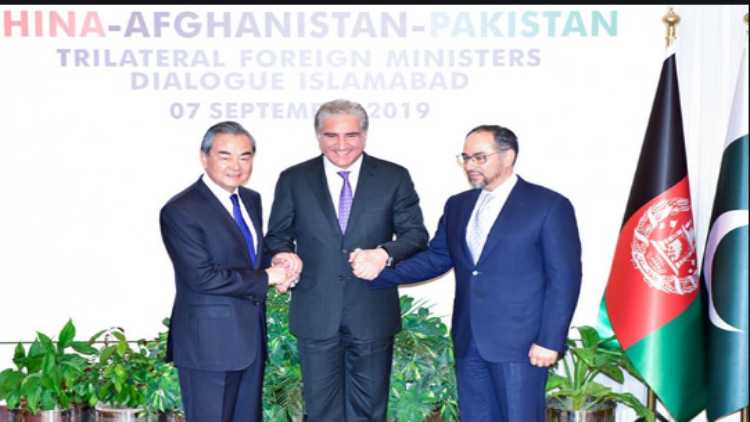Aasha Khosa/New Delhi
Ominous signs are emerging from Afghanistan as the troika of China-Pakistan-Turkey seems keen to have a bigger footprint and hold on to Kabul while New Delhi has just made contacts with a faction of the Afghan Taliban in the run-up to the US forces September 11 withdrawal from the country.
Amidst reports of clashes between Taliban fighters and Afghan troops and the latter gaining territorial control over at least five districts of Afghanistan and the US is sticking to its 9/11 deadline after 20 years of hunting down Al Qaeda, the United Nations has warned that the Al Qaeda is alive and kicking.
The report by a UN monitoring team says that the Taliban and Al Qaeda “remain closely aligned and show no indication of breaking ties.”
Last week, China’s foreign minister Wang Yi hosted the fourth China-Afghanistan-Pakistan Trilateral Foreign Ministers' Dialogue via video link. According to Chinese media, the three foreign ministers including Shah Mehmood Qureshi and Mohammad Haneef Atmar reached a consensus on “promoting the peace process in Afghanistan and anti-terrorism and security cooperation.”
Interestingly as the US and NATO forces are working out modalities of withdrawal, Turkey, a NATO member country has volunteered to operate and provide security to the Hamid Karzai international airport at Kabul.
Given Islamabad’s proximity to Turkey and R T Erdgaon’s dream of creating a ‘Caliphate’, the Turkish presence in the neighbourhood is not a positive development for India.According to a report in TRT (Turkish Radio and Television) news agency controlled by the government, at a meeting of NATO members held in the last week of May, Turkey has made an offer to secure the key airport that also acts as a military base in Kabul.
The USA is yet to fully agree to Ankara’s conditions for the proposal and the deal is likely to be further worked out in the coming meeting between President Joe Biden and Reccip T Erdogan in Washington.
According to a report in Pakistan Tribune International, China is pushing a narrative in which it’s making Kabul realize that it must join the Road and Belt Initiative (RBI) and see the benefits it would get through the Gwadar seaport.
The report prepared by a Russian analyst says that Afghanistan understands that it should not depend on the Chabahar port in Iran that is constructed by India for giving access to landlocked Afghanistan to the sea. A proposed railway line PAKAUZ (Pakistan-Afghanistan-Uzbekistan) is also in a bait being thrown to Kabul for reconciling its differences with Pakistan.
Kabul however remains deeply suspicious of Islamabad’s intentions and has always accused it of supporting the Taliban for creating terror in Afghanistan.
Afghan government led by Ashraf Ghani have been telling the USA and the world at large that the roots of the Al Qaeda network are still alive in Afghanistan and the group still poses a threat to the country and the world and is collaborating with the Taliban.
On May 2, the death anniversary of the killing of Al Qaeda leader Osama bin Laden by the US forces in Pakistan, Afghanistan’s National Defence Security chief Ahmad Zia Saraj said, “Right now, al-Qaeda and Taliban are not two different ideologic topics; they are beyond that as they have intermarried within their families.”
The Afghan government sees the Taliban’s ties with al-Qaeda as a key challenge in the way of the peace process. Its talk with the Taliban, therefore, have not made much progress.
“Even though the Taliban has agreed with the US to cut ties with al-Qaeda and other terrorist groups, al-Qaeda is still fighting among the Taliban,” said Rahmatullah Andar, spokesman for National Security Council.
Though the Taliban rejected any type of relations with al-Qaeda, the UN report has confirmed the worst fears of those who care for the security in the South Asian region after the exit of the US and the NATO forces.
India is the largest regional contributor to Afghanistan’s reconstruction and development efforts with pledges of $3 billion but has lagged behind other regional players such as Russia, China and Iran in establishing contacts with the Taliban in joining actively in helping the post-US withdrawal scenario.
However, New Delhi also seems to be rising to the occasion and taking the initiative to get in touch with the Taliban.

